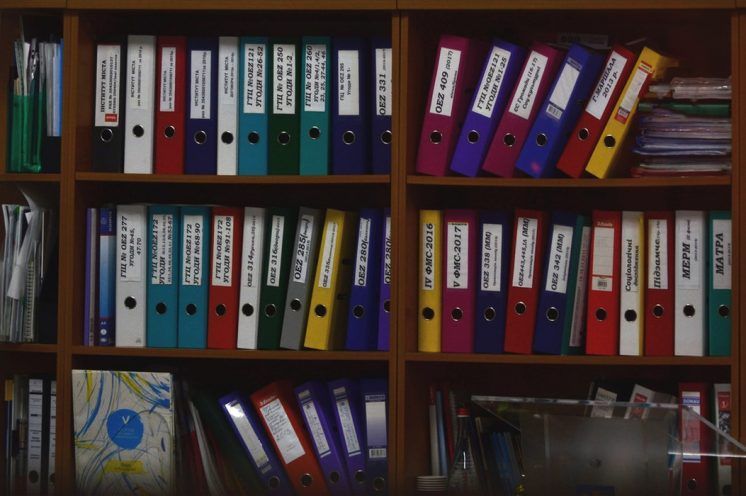
THE RISKS OF STORING PHYSICAL DOCUMENTS IN-HOUSE.
In many cases, keeping a hold of physical documents is an essential business practice. Electronic copies often do not constitute sufficient proof in certain legal and financial contexts, and the vision of a ‘paperless office’ is simply not realistic for businesses that deal primarily in legal contracts, mortgage papers, and classified documentation.However, all businesses should heed the main risks associated with keeping paper copies of important documents in their company offices. Compared to computerised methods of storage, it may seem outdated and unsafe. After all, it’s harder to encrypt and restrict access to a paper document than it is a digital file. And while there are safe ways of storing hard copy documents, you need to assess the risks associated with your own methods of storing such documents before any degree of safety is 100% guaranteed. Only then can you rest easy in the knowledge that your physical data is in safe hands. Let’s take a look at the main risks…
DAMAGE
With workers making heavy use of electrical outlets and strained equipment that can overheat, office spaces are more vulnerable to fires than the average home. In the event of an office fire, there is a risk of losing your entire company archive as flames spread quickly through the paper. This risk is exacerbated by the fact that physical documents are usually kept in the same place, such as a set of filing cabinets or a storage room. Similar risks are also posed by moisture: workers can spill drinks, sprinklers can go off, pipes can leak, and moisture can build up in unventilated rooms. This kind of damage can be irreparable, whatever the source may be.While you may be able to recover damaged electronic files from backups you have made, backups of physical documents cannot maintain the authenticity and validity of the original – photocopies and scanned copies of the original hard copy cannot be considered sufficient proof. In other words: if a paper document is damaged as a result of these common office hazards, there’s no going back. So what can you do to protect your physical documents from damage?You could update your paper storage system to ensure that all your documents are protected, but fireproof and waterproof storage boxes are often too expensive and lacking in capacity. Office managers can (and should) take provisions to mitigate the risk of fire and water damage, but you should be aware that these risks can never be eliminated outright unless the documents are moved to a much safer location away from untrained employees and electrical equipment.
SECURITY RISKS
Although there is a large emphasis on the benefits of digital storage for modern businesses, there is still a need for some companies to store their documents in physical form. However, paper documents can easily fall into the wrong hands in just the same way as digital files can, and businesses should still be taking measures to protect against physical security breaches. This process will involve placing internal restrictions on who can access certain documents, storing documents in a safe and secure location, and destroying documents in a secure way.Businesses that maintain a relaxed or inadequate approach to the security of their documents are putting their sensitive documents at risk of being stolen or accessed by the wrong people. You may be wondering how exactly your paper documents are at risk when you are keeping them locked in office cabinets. In truth, even if your office is protected against external access, you still cannot guarantee that your documents are secure. Many security breaches are internal, carried out by people within a company who already has easy access to the physical system. Likewise, paper documents can be compromised after they have been destroyed and have made their way out of the office in rubbish bags – we talk more about the risks of insufficient document destruction below.This shows that storing physical documents in your office does not fully guarantee their safety. Access to physical documents should be heavily restricted and tracked according to strict guidelines and procedures – employers may want to consider hiring a data security manager who can help implement these measures and safeguard your physical systems. Alternatively, since bringing on a new hire involves considerable expense, one way to protect your documents from internal security risks is to keep them in external storage. The best storage companies will keep your documents in a secure and protected system with highly restricted access.
DATA LOSS
It’s no use keeping paper documents in storage if you don’t know how and where to find them. The onus is on businesses to ensure that paperwork is easily accessible to the right employees, that documents are recorded and tracked, and that all data is managed according to a defined (and preferably government approved) protocol. By neglecting these important responsibilities, you make it much easier for information to get permanently lost.The effects of losing or misplacing your documents are similar to the effects of damaging them: in both cases, its almost impossible to retrieve the documents in its original and authentic form. If you misplace the original copy of a signed document, no matter how many copies you have, that document can no longer be used for its intended purpose. The only big difference is that simply losing your documents is most likely to result from poor in-house document management as opposed to circumstances beyond your control (e.g. electrical fires and water leaks).That is to say, if you are not properly tracking and recording the location of your documents, they are more likely to get lost in the shuffle and never be seen again. While this is a major risk, we’ve established that it is often essential for businesses to keep physical copies of certain documents such as legal contracts, customer data, purchase receipts, and financial paperwork. Businesses have two options – devise and enforce an internal document management system, or outsource the job to a document management company who can scan, organise, and track your archive of physical documents on your behalf. Which of these routes is more convenient in financial and logistical terms largely depends on the business in question. But in either case, your sensitive data is less likely to go missing, your documents will be much easier to retrieve, and your employees will spend less time and effort digging around for papers.
DESTRUCTION
We already discussed the risk of your documents being destroyed through accidental reasons. But what about the risk of being unable to destroy your documents enough? Unlike digital files, paper documents cannot be permanently deleted in a single click. Ensuring that your unwanted documents cannot be accessed or stolen after they have seemingly been destroyed requires you to take certain security measures. Most businesses know that it’s unsafe to simply throw important paper documents in the bin, and the use of shredders is common practice.However, a shredded document is not necessarily an unreadable and inaccessible document – some types of shredding are more secure than others. With more basic types of shredding (such as the type seen in simple office shredders) it is possible for the shredded document to be reassembled and compromised should the scraps fall into the hands of a malicious party. Sure, this might all sound a bit unlikely, but anyone who has been keeping an eye on the news lately will understand that its better to be safe than sorry when it comes to protecting company data.Experts recommend the use of more advanced shredders when destroying paper documents, such as particle-cut shredders with the capacity to grind papers down to minuscule particles, eliminating the possibility of documents being reassembled after destruction. However, professional equipment of this kind can be expensive for ordinary small-to-medium businesses, and many outsource their document destruction with an external shredding company instead. The team at Flexible Storage use industrial pierce-and-tear shredders to securely destroy any paper documents that are no longer needed. Not only will this offer businesses peace of mind, but it will also help reduce the cost and effort required for secure document destruction..At Flexible Storage, our priority is to meet the long and short term needs of your company while keeping all your documents as safe and secure as possible. Get in touch to make an appointment and discuss your requirements with one of our friendly storage consultants.








